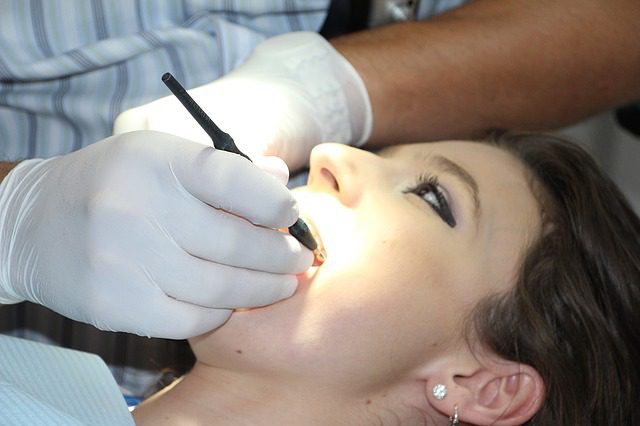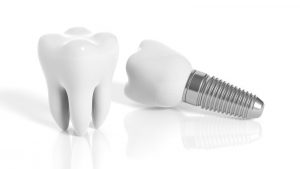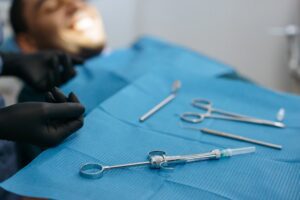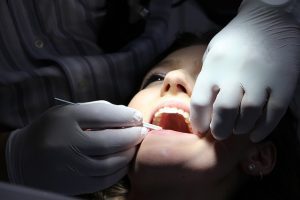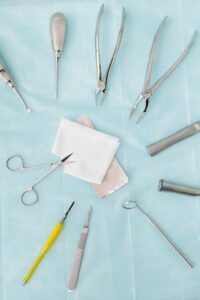There are many reasons you might need to have a tooth extracted. A tooth that’s cracked past the gum line, decayed or infected might need taken out. Maybe you needed your wisdom teeth removed. Or maybe it got accidentally extracted (read: knocked out) in an accident.
Whatever the reason, having a tooth taken out is unpleasant. It feels weird afterwards, and makes eating and drinking feel strange. And unfortunately, sometimes you can’t get tooth replacement immediately, especially if you needed a dental bone graft and the area needs time to heal before you can get dental implant surgery.
Keeping proper care of that gap in your teeth in the meantime is absolutely vital to keeping your gums, other teeth, and even your jaw healthy while you wait for it to heal. Without proper oral care after your surgery, you could end up with a host of issues that can add up to some pretty dangerous stuff.
Dry Socket & How to Avoid it
One complication that can arise from a tooth extraction is dry socket. What’s dry socket? When you get a tooth taken out, your body makes a blood clot at the site to protect the empty socket. Dry socket can happen when the blood clot gets moved, damaged or destroyed. Since it leaves the socket unprotected and open to the elements, dry socket can slow or completely stop the healing process.
You can avoid dry socket relatively easily; you just have to care for the empty socket the way you would care for any other damaged body part – be careful about it and mindful of it:
- Rinse with saltwater a few times per day.
- Be very gentle when brushing.
- Avoid suction actions like using straws to drink.
- Skip the gym for a few days.
- Stay away from crunchy foods since they have sharp edges when chewed.
- As always, don’t smoke.
How do you know if you have dry socket? There’s a few symptoms that are telltale signs.
- Sharp, intense pains days after surgery
- Visible bone in the socket
- Radiating pain
- A bad smell in your mouth
You should go see your oral surgeon or emergency dentist immediately if you develop these symptoms. While dry socket itself isn’t an infection, it certainly leaves you more susceptible to developing one.
Socket Infection & How to Avoid it
The big thing we always want to avoid after an oral procedure is infection. Even something as simple as a tooth extraction can become a scary infection that spreads into your jawbone if you aren’t on top of your aftercare.
We do our part to help prevent infection after your tooth is removed:
- Sterile surgical techniques
- Minimally-invasive oral surgeries
- Holistic bone and gum augmentation (if needed)
- Natural pain and inflammation management
- Short-term antibiotics
- Detailed aftercare instructions to take home with you
And you have a part to play, too. Things you can do to prevent post-op infection include:
- Take care of that all-important clot.
- Use natural remedies like garlic and clove oil to gently disinfect and relieve pain.
- Avoid sugary foods, as they cause acids that bacteria love.
- Follow your oral surgeon’s post-op directions!
How do you know you’re on the brink of an infection? Oral infections at the site of a tooth extraction present many of the same symptoms as dry socket, but will become more severe and numerous if left to fester. Look out for:
- Swelling that is severe and/or lasts more than a few days post-procedure
- Pain that is severe and/or lasts more than a few days post-procedure
- Bleeding that is severe and/or lasts more than 1-2 days post-procedure
- Bad taste in the mouth
- Pus discharge at the site of the tooth removal
- Fever
- A new pain/discomfort after the initial surgery-related pain subsides
While some signs of infection might be immediate, others may not present until a week or two post-surgery. Even 1% worried something’s not right with the site of your removed tooth? Give us a call. Better safe than sorry.
Why Tooth Replacement is Vital After an Extraction
Not to seem alarmist, but your jaw starts deteriorating at the site of the tooth extraction pretty much immediately. That’s why caring for the area so you can get holistic tooth replacement ASAP is important to preserving the health of your mouth.
The way your teeth are attached to your jaw, they work together to keep each other healthy. When a tooth is removed, suddenly no more blood flow goes to that part of the jaw, which causes it to begin to weaken. This can also cause your other teeth to move, and then you’ve got a whole snowball effect.
So listen to your oral surgeon about tooth extraction aftercare. It’s best for your health, and it means that when you get to the tooth replacement stage, your jaw is healthy enough for the most holistic options available, like dental implants.
All Healed Up? Options for Tooth Replacement
The optimal option for holistic tooth replacement is dental implant surgery. Both titanium and zirconia dental implants replace the tooth and its root. After dental implant surgery, your jaw will heal around the new root and fuse to it. That means no jaw deterioration and no moving teeth. Dental implants last decades and most people forget they’re not a natural tooth. If you keep your empty socket healthy and happy after your tooth extraction, chances are your oral surgeon will be able to give you a dental implant, even if you need a bit of dental bone grafting first.
For mouths that have suffered a bit too much damage to take a dental implant, there are other options like dental bridges and dentures. These are more cosmetic than holistic types of tooth replacement, but they still preserve the health of your mouth. They take a bit more maintenance and will need replaced every so often, though, because any time you have missing teeth, your jaw will continue to move slowly over time.
Just a little bit of mindful aftercare gets you a long way as far as being able to restore the appearance and health of your smile. So heed your oral surgeon when they tell you not to eat a plate of nachos when you get home from your tooth extraction. And maybe grab a pack of nicotine patches on the way home if you can’t cold-turkey your smoking habit.
Need a troublesome tooth removed, suffering from facial trauma, or thinking about dental implants? Call our office with any inquiries and to schedule a consultation with our oral surgeon.
